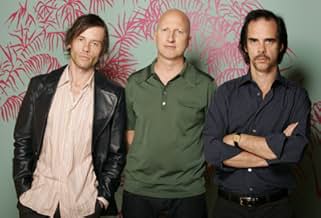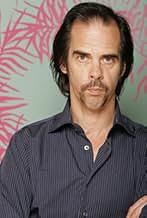Um homem da lei captura um famoso fora a lei e dá-lhe nove dias para matar seu irmão mais velho, ou então eles executarão seu irmão mais novo.Um homem da lei captura um famoso fora a lei e dá-lhe nove dias para matar seu irmão mais velho, ou então eles executarão seu irmão mais novo.Um homem da lei captura um famoso fora a lei e dá-lhe nove dias para matar seu irmão mais velho, ou então eles executarão seu irmão mais novo.
- Direção
- Roteirista
- Artistas
- Prêmios
- 14 vitórias e 30 indicações no total
Avaliações em destaque
Captain Stanley goes after the murderous Burns brothers by setting them against each other. His proposition is that middle brother Charlie kill older brother Arthur, in order to save younger brother Mike from the noose. It is expedient justice but also astute psychology on Stanley's part; Charlie seems less than reluctant to take on the task of dispensing with his charismatic but psychotic older sibling.
Stanley's mantra is that he will civilize this land, but his failing is in choosing the wrong target. His treacherous sergeant, feeble superior, and uptight wife together conspire through ignorance and fear to undo the Captain's intent. When Mike is flogged beyond reason and physical endurance, the Captain's moral argument is won, but perhaps at the price of all their lives, as the Burns brothers come seeking vengeance.
Pearce adds impressively to his CV, in an understated but powerful performance as the brooding middle brother. Stanley is not exactly a good guy, but as much on the side of good as it is possible to be in this God-forsaken landscape. It has taken a while to get used to Winstone in such roles, starting with Sexy beast, but he is wearing them with aplomb now. Danny Huston is a pleasant surprise as the educated but deranged Arthur, while John Hurt revels in playing against type. Emily Watson, never less than excellent, embodies the prim Victorian. My own first impression of Australia was flies, flies, flies, and Hillcoat captures this. The question is not why there are so many flies in this film, but why they are curiously absent from other Australian films. They are both a metaphor for the squalor and decay that infest existence, and an acutely observed detail of the arena.
Before the British, other Europeans famously arrived in Australia but considered the landscape uninhabitable. Threaded through The Proposition is the suggestion that they were right.
The broader reference is the existence of our dark side, embodied in Arthur, a Kurtz-like figure, a god-like presence in an inhospitable landscape, facing an assassin dispatched from a 'civilization' that does not like what he reminds them of. The film references Conrad's infamous tale but anchors it in this universal tale of white men's ill-fated attempts to conquer a land where they do not belong. The aborigines tolerate them, or despair of them. "Strange, you whities" says Jacko, while house servant Tobey shows his role as subservient ends at the garden gate, where he leaves his boots and returns to his barefoot roots. Two Bob simply abandons his white mates at the end. Like the land, their attitudes to these invaders range from indifferent to hostile.
The Proposition is less poetic violence than violent poetry. Too much to take in here in one viewing, in time to come this might just match Walkabout as the masterpiece of Australia-set cinema.
There's a fantastic blend of European and Australian sensibilities here that makes this the least clichéd film to come out of this country for 20-odd years - and if it doesn't do well, it'll be because an increasingly soft and gutless nation is afraid to venture out of their frappuccino and mortgage comfort zone.
This is powerful, worthy art.
At the opening credits Charlie and his younger brother the 14-year-old Mikey are captured after a bloody shoot out with regional Captain Stanley in the aftermath of a brutal rape and murder The decent captain is after their eldest brother Arthur described as 'the beast,' and is prepared to do just about anything to get him...
Thus Stanley lays out Charlie an unholy bargain: While Mikey stays in his custody, in jail, Charlie must find, kill or return Arthur or his teenaged brother will be hung on Christmas Day He has nine days to do so
Charlie eventually finds his brother but is left with one choice He must decide if he can live with his decision to either kill Arthur or let Mikey be executed
John Hillcoat's characters not only strike us with their emotions of grief and pain, or their passion of hate but they are presented in their real states that sway down hopelessness, denial, pity and firm belief
Pearce combines a touch of kindness to Charlie's character, but it's a touch that keeps out of the way any love It's, in essence, only enough to add a decisive influence on his personality that makes him unpredictable
Danny Huston is magnificent as Arthur Burns His deeply intelligence and totally brutal character is captured in a very good sense
Richard Wilson, Mikey is given little to do beyond being frightened and horrorized
Winstone is amazing in the role of the army officer who wants to civilize the place We feel how his nerves are about to break He imprisons his wife Martha for safety and protection caring at the same time about her delicate sensibilities
Emily Watson is absolutely stunning as the fragile woman whose gentleness captures convincingly the character of Emily, the innocent wife who cares about her husband, her house and her perfect "garden" but her way of life is so far away from the reality of her surroundings
John Hurt gives an interesting performance as the deranged bounty hunter
"The Proposition" is too violent, too dirty, too bloody, and too barbaric to be forgotten so easily
You always know what you're going to get with a film by Australian director John Hillcoat namely strong memorable drama that's best viewed with a ready supply of anti-depressants . You also know what you're not going to get , laughs , mirth and a strong narrative drive . Certainly both GHOSTS OF THE CIVIL DEAD and THE ROAD suffered slightly from a lack of a strong narrative drive and in this British produced pseudo Western set in 19th Century Australia there's also a sign of this flaw from the director
The premise is one that grabs you and leads you to ask what you would do in that situation but as soon as Charlie leaves town on his quest the story meanders slightly as we're shown lots of panoramas of the Australian outback with a vague mystical air which will remind you of Australian cinema of the 1970s where the landscapes were the stars of the movie . One also gets the feeling in the first third that you're might be watching an Aussie version of APOCALYPSE NOW where a man with a mission involving extreme prejudice finds his target building an empire amongst the natives
This doesn't happen thankfully and after a slightly unfocused first 40 minutes the story gets back on track with characterisation coming to the fore . THE PROPOSITION is much more character driven than the premise promises . There is a slight cop out in that Mickey is the poor unintelligent younger brother who has merely tagged along with the gang through family peer pressure and while Arthur isn't portrayed by Danny Huston as a stock psychotic villain with staring eyes and manic laugh his actions do more than enough to convince the audience that this rabid criminal dog needs to be put out of his misery . The characterisation between the good younger brother and the violent bad older brother could been written and developed as a bit more grey but there again it might have made it more difficult to cheer on Charlie the middle brother played by Guy Pearce
The cast are excellent and special mention goes to Ray Winstone who is a national institution in Britain and watching him here you're aware of how underrated he is and gives a depth to Captain Stanley a man tormented by trying to uphold the law without giving in to rough justice from the locals . It's perhaps difficult to believe a rough working class bloke would be married to Emily Watson's rather middle class Martha but Watson does manage to project an innocence that seems out of place but that's undoubtedly the point . One character that did puzzle me was Jellon Lamb . John Hurt of course steals the show every scene he appears in but is there any point to the character except to spout Darwin ? it's a slightly confused and unnecessary character
And THE PROPOSITION is a slightly confused film that stops it from attaining true classic status . It's a bleak nihilistic character study from John Hillcoat and contains all the strengths and weaknesses from the director's prior and future work . That said it's much better than most of the films the UK Film Council insist on wasting their money on from the same period
One thing that is there throughout the 104 minutes is the excellent cinematography. This is a pretty film, nicely shot with some beautiful scenery and colors, stylish at times, too. To me, this was the best part of the movie. It's indeed a visual treat. Benoit Delholmme deservedly won several international awards for his camera-work in here.
The story is uniquely presented, different enough that it kept me very involved wondering what was coming next. For those expecting a brainless revenge story or shoot 'em up western, they will be disappointed. There is a lot of thought to this film, and it varies scene- to-scene from classy to crude.
Guy Pearce, Ray Winstone and Emily Watson are three actors I am familiar with, and I enjoyed all three of their performances. This is not a well-known movie here in the States, but if you like tough westerns and something a bit different, check it out.
Você sabia?
- CuriosidadesIn a 2018 interview, Guy Pearce said that this is his favorite of all of the movies he's ever done.
- Erros de gravaçãoAlthough the story takes place in the 1880s, Jellon sings "Danny Boy" - which wasn't published until 1913.
- Citações
Jellon Lamb: Forgive me, sir, but I've been stuck here with no one but this sorry sack of Hibernian pig shit for conversation. Poor, poor Dan O'Reilly. Sit, sir. Drink with me.
[Charlie cocks his gun and points it to Lamb]
Charlie Burns: One more crack about the Irish, Mr. Lamb, and I'll shoot you. Am I clear?
Jellon Lamb: Oh, as the waters of Ennis, sir. Let us drink, then, to the Irish. No finer race of men have ever... peeled a potato.
[Charlie cocks his gun again and points it to Lamb]
Charlie Burns: Do you pray, Mr. Lamb?
- Cenas durante ou pós-créditosThe opening credits are shown first against a background of period photographs of Australia, which after a time become photographs of the actors/characters, locations and scenes in the film. The end credits are similarly displayed, but only period photographs are used. This is of special note in view of the noted disclaimer, since some indigenous aboriginal groups can be offended by such images.
- Trilhas sonorasThere Is a Happy Land
(1850)
Traditional
Music by Leonard P. Breedlove (uncredited) (1850)
Words by Andrew Young (1838)
Arranged by Nick Cave and Warren Ellis
Principais escolhas
- How long is The Proposition?Fornecido pela Alexa
Detalhes
Bilheteria
- Orçamento
- US$ 20.000.000 (estimativa)
- Faturamento bruto nos EUA e Canadá
- US$ 1.903.434
- Fim de semana de estreia nos EUA e Canadá
- US$ 32.681
- 7 de mai. de 2006
- Faturamento bruto mundial
- US$ 5.048.893
- Tempo de duração
- 1 h 44 min(104 min)
- Cor
- Mixagem de som
- Proporção
- 2.39 : 1







































